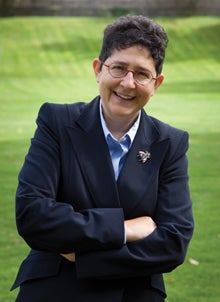5-Minute Expert
The Mystery of Mood
A writer pushes the boundaries of how we convey this fundamental, yet poorly understood, side of life

Night Bloom (1999)
Awkward: A Detour (2007)
Called Back: My Reply to Cancer, My Return to Life (2009)
Swallow: Foreign Bodies, Their Ingestion, Inspiration, and the Curious Doctor Who Extracted Them (2011)
And look for Cappello’s writing in: Salmagundi, Hotel Amerika, Southwest Review, Cabinet Magazine, Georgia Review, The New York Times, Salon, and NPR.
Mary Cappello is no stranger to awards, but few come in this form: a residential fellowship in the heart of one of Europe’s biggest cities, as this year’s Holtzbrink Fellow at the American Academy in Berlin. It is, in fact, a rare gift: the right place, and time, for exploration. Cappello won’t be wasting it.
A URI professor of English, Cappello has been widely published and won numerous honors, including Guggenheim and Fulbright fellowships. In Berlin, Cappello is completing her fifth book, Life Breaks In: A Mood Almanack, which she describes as a collection of lyric essays and experimental prose on the subject of mood. It is due out in fall 2016 from the University of Chicago Press.
The American Academy bills itself as “determinedly non-monastic; our fellows become involved in Berlin’s cultural, social, and intellectual scene.” Still, Cappello wasn’t entirely prepared: “One of the things that I keep discovering here in Berlin is that every question I’ve been formulating over the years in my attic study in Providence has an entire institute devoted to it,” she writes via email. “Our days at the Academy are filled with surprises, because we never quite know who might show up for dinner… Several weeks ago, I found myself unexpectedly seated across from Norman Lear.”
Cappello’s fellow Fellows in Berlin include a novelist, a visual artist and filmmaker, several historians, two anthropologists, a philosopher of science, and a Marxist cultural theorist. And then there is Berlin itself, a city Cappello describes as “perpetually in transition, and one in which every brick and street corner is riddled with an intractable history. The villa where the Academy stands is directly across the lake from another villa in which Hitler formulated the terms of the Final Solution. That villa stands very near to that of the great painter, Max Liebermann, who, we could say, was lucky to have died just before the outbreak of the war. Both houses are now museums.”
Amid it all, Cappello remains focused on one of humanity’s most elusive yet all-encom-passing experiences, as in this excerpt, from the chapter “Mood Modulations” in Life Breaks In:
“We speak of an illness needing to ‘take its course,’ by which we mean that it is both out of our control and sure to pass; we, however reluctantly, allow the illness its own movement, and rest assured that it will arrive at a statistically predictable petering out. But mood doesn’t work this way. Moods don’t follow a chartable path or career. We can’t grant them seven stages or 12 steps. A fever ‘comes on’; an illness is something we ‘contract.’ A mood, on the other hand, ‘comes over us,’ like a cloud or a mantel thrown over the soul. ‘What’s come over you?’ we ask, when we mean what mood are you submitting to, to the detriment of yourself and others? What change of mood or alteration is possessing you? On a brighter note, what are you allowing yourself to become?” •
 Home
Home Browse
Browse Close
Close Events
Events Maps
Maps Email
Email Brightspace
Brightspace eCampus
eCampus


